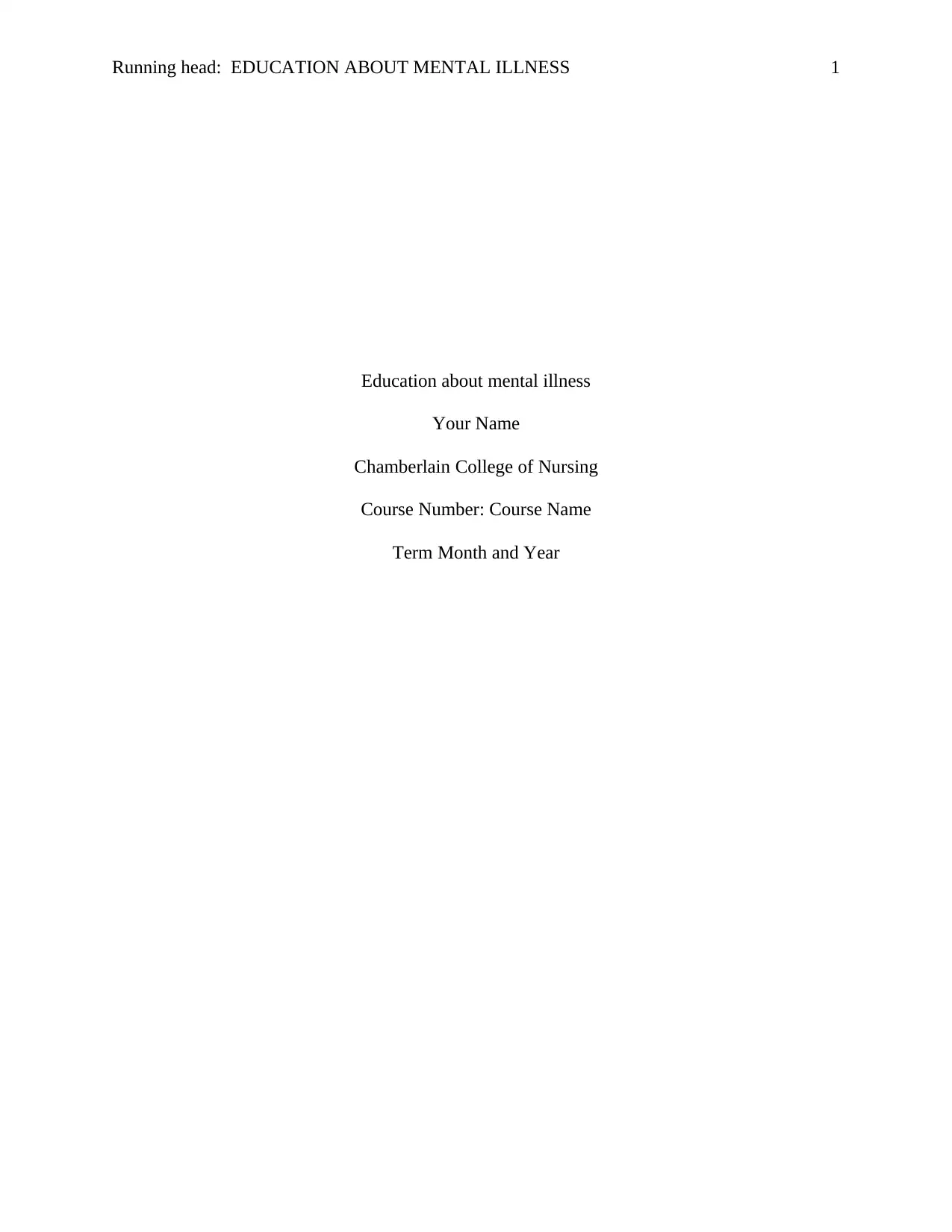Education About Mental Illness: A Pro-Position Paper - Nursing
VerifiedAdded on 2023/04/23
|5
|901
|189
Essay
AI Summary
This essay argues for expanded educational resources regarding mental illness to reduce public stigma, avoid crime and victimization, and promote better lives for those affected. It highlights how stigma discourages people from seeking care, leading to reduced autonomy and poor treatment outcomes. The paper uses evidence to support the claim that education can reduce stereotypes, promote informed decisions, and improve the quality of life for individuals with mental illness by addressing issues such as avoidance, violence, and marginalization. The essay concludes that distributing educational resources is crucial for helping mentally ill individuals live with dignity.

Running head: EDUCATION ABOUT MENTAL ILLNESS 1
Education about mental illness
Your Name
Chamberlain College of Nursing
Course Number: Course Name
Term Month and Year
Education about mental illness
Your Name
Chamberlain College of Nursing
Course Number: Course Name
Term Month and Year
Paraphrase This Document
Need a fresh take? Get an instant paraphrase of this document with our AI Paraphraser

MENTAL ILLNESS
Education about mental illness
One in every five adults suffers from mental illness in U.S. Depression and anxiety is the
most common form of mental illness. Most people do not seek the right treatment at the right
time and treat people differently because unawareness about mental illness and stigma associated
with mental illness. Expanding resource to educate public about mental illness is important to
minimize the negative attitude help due to stigmatizing attitude towards people.
Context
The main position for this paper is that stigma linked to mental disorder is rising and with
this, people with mental problem have become more vulnerable. There are many evidences that
demonstrate the public stigma. Parcesepe and Cabassa (2013) argue that it is a barrier that
discourages common people in United States from seeking care in mental health care system.
Stigma or discrimination against mental illness further results in reduced autonomy, segregation,
little engagement in mental health care and worst treatment outcome. The importance of
educating people about mental illness is also evidenced from the fact that stigmatizing beliefs
restrict opportunities and reduce independence. Other adverse impact that stigma has on people
with mental illness includes avoidance, withholding help, coercive treatment and segregated
institutions. Hence, the thesis statement for the paper is that education to take informed decision
against mental illness and reduce stereotypes (Link et al., 2015).
1st Pro-Point
Educational resource related to mental illness is critical to reduce public stigma of mental
illness. This ground is further proved by the evidence by Choudhry et al. (2016) that many
people stop contacting services once they are diagnosed with mental illness. This implies that
attitude and beliefs about mental illness are shaped by personal knowledge about mental illness.
Education about mental illness
One in every five adults suffers from mental illness in U.S. Depression and anxiety is the
most common form of mental illness. Most people do not seek the right treatment at the right
time and treat people differently because unawareness about mental illness and stigma associated
with mental illness. Expanding resource to educate public about mental illness is important to
minimize the negative attitude help due to stigmatizing attitude towards people.
Context
The main position for this paper is that stigma linked to mental disorder is rising and with
this, people with mental problem have become more vulnerable. There are many evidences that
demonstrate the public stigma. Parcesepe and Cabassa (2013) argue that it is a barrier that
discourages common people in United States from seeking care in mental health care system.
Stigma or discrimination against mental illness further results in reduced autonomy, segregation,
little engagement in mental health care and worst treatment outcome. The importance of
educating people about mental illness is also evidenced from the fact that stigmatizing beliefs
restrict opportunities and reduce independence. Other adverse impact that stigma has on people
with mental illness includes avoidance, withholding help, coercive treatment and segregated
institutions. Hence, the thesis statement for the paper is that education to take informed decision
against mental illness and reduce stereotypes (Link et al., 2015).
1st Pro-Point
Educational resource related to mental illness is critical to reduce public stigma of mental
illness. This ground is further proved by the evidence by Choudhry et al. (2016) that many
people stop contacting services once they are diagnosed with mental illness. This implies that
attitude and beliefs about mental illness are shaped by personal knowledge about mental illness.

MENTAL ILLNESS
This gives implication to develop management plan so that proper management plan is
developed regarding modifying beliefs about people and raising awareness about mental illness.
It will also create the pathway to understand the biopsychosocial cause of mental illness.
2nd Pro-Point
The second point that validates the claim for expanding education about mental illness
includes avoidance of crime and victimization. Varshney et al. (2016) assumes that mental
illness and violence are directly linked and media plays a major role in victimizing patients. The
resultant societal bias threatens people and contributes to self harm and suicidal behavior too.
Hence, people with severe mental illness are victims to violence and this result in physical
trauma and poor quality of life of patient. Koschorke et al. (2014) also reports that many people
with mental illness report being marginalized by society. Hence, equivalent care can be a
possibility if educational campaign related to mental illness awareness is initiated.
3rd Pro-Point
The third point validating the thesis related to education about mental illness is that it can
help promote a longer and happier life for people. Educational resource will be the platform that
will empower patient to be hopeful towards their life and embrace new opportunities in career
too. Education can give voice to mentally ill patient and improve long term health. It will
incorporate four dimensions like dignity and respect, belonging, self reliance and participation in
decisions.
Conclusion
By the review of several evidences on suicide and depression due to stigma, the
important of education related to mental illness is considered even more important. Making an
This gives implication to develop management plan so that proper management plan is
developed regarding modifying beliefs about people and raising awareness about mental illness.
It will also create the pathway to understand the biopsychosocial cause of mental illness.
2nd Pro-Point
The second point that validates the claim for expanding education about mental illness
includes avoidance of crime and victimization. Varshney et al. (2016) assumes that mental
illness and violence are directly linked and media plays a major role in victimizing patients. The
resultant societal bias threatens people and contributes to self harm and suicidal behavior too.
Hence, people with severe mental illness are victims to violence and this result in physical
trauma and poor quality of life of patient. Koschorke et al. (2014) also reports that many people
with mental illness report being marginalized by society. Hence, equivalent care can be a
possibility if educational campaign related to mental illness awareness is initiated.
3rd Pro-Point
The third point validating the thesis related to education about mental illness is that it can
help promote a longer and happier life for people. Educational resource will be the platform that
will empower patient to be hopeful towards their life and embrace new opportunities in career
too. Education can give voice to mentally ill patient and improve long term health. It will
incorporate four dimensions like dignity and respect, belonging, self reliance and participation in
decisions.
Conclusion
By the review of several evidences on suicide and depression due to stigma, the
important of education related to mental illness is considered even more important. Making an
⊘ This is a preview!⊘
Do you want full access?
Subscribe today to unlock all pages.

Trusted by 1+ million students worldwide

MENTAL ILLNESS
effort to distribute educational resource to public is important to help mentally ill people live
with dignity.
effort to distribute educational resource to public is important to help mentally ill people live
with dignity.
Paraphrase This Document
Need a fresh take? Get an instant paraphrase of this document with our AI Paraphraser

MENTAL ILLNESS
References
Choudhry, F. R., Mani, V., Ming, L. C., & Khan, T. M. (2016). Beliefs and perception about
mental health issues: a meta-synthesis. Neuropsychiatric disease and treatment, 12,
2807-2818. doi:10.2147/NDT.S111543
Koschorke, M., Padmavati, R., Kumar, S., Cohen, A., Weiss, H. A., Chatterjee, S., ... & Balaji,
M. (2014). Experiences of stigma and discrimination of people with schizophrenia in
India. Social Science & Medicine, 123, 149-159.
Link, B. G., Wells, J., Phelan, J. C., & Yang, L. (2015). Understanding the importance of
“symbolic interaction stigma”: How expectations about the reactions of others adds to the
burden of mental illness stigma. Psychiatric rehabilitation journal, 38(2), 117.
Parcesepe, A. M., & Cabassa, L. J. (2013). Public stigma of mental illness in the United States: a
systematic literature review. Administration and policy in mental health, 40(5), 384-99.
Varshney, M., Mahapatra, A., Krishnan, V., Gupta, R., & Deb, K. S. (2016). Violence and
mental illness: what is the true story?. J Epidemiol Community Health, 70(3), 223-225.
References
Choudhry, F. R., Mani, V., Ming, L. C., & Khan, T. M. (2016). Beliefs and perception about
mental health issues: a meta-synthesis. Neuropsychiatric disease and treatment, 12,
2807-2818. doi:10.2147/NDT.S111543
Koschorke, M., Padmavati, R., Kumar, S., Cohen, A., Weiss, H. A., Chatterjee, S., ... & Balaji,
M. (2014). Experiences of stigma and discrimination of people with schizophrenia in
India. Social Science & Medicine, 123, 149-159.
Link, B. G., Wells, J., Phelan, J. C., & Yang, L. (2015). Understanding the importance of
“symbolic interaction stigma”: How expectations about the reactions of others adds to the
burden of mental illness stigma. Psychiatric rehabilitation journal, 38(2), 117.
Parcesepe, A. M., & Cabassa, L. J. (2013). Public stigma of mental illness in the United States: a
systematic literature review. Administration and policy in mental health, 40(5), 384-99.
Varshney, M., Mahapatra, A., Krishnan, V., Gupta, R., & Deb, K. S. (2016). Violence and
mental illness: what is the true story?. J Epidemiol Community Health, 70(3), 223-225.
1 out of 5
Related Documents
Your All-in-One AI-Powered Toolkit for Academic Success.
+13062052269
info@desklib.com
Available 24*7 on WhatsApp / Email
![[object Object]](/_next/static/media/star-bottom.7253800d.svg)
Unlock your academic potential
Copyright © 2020–2026 A2Z Services. All Rights Reserved. Developed and managed by ZUCOL.





